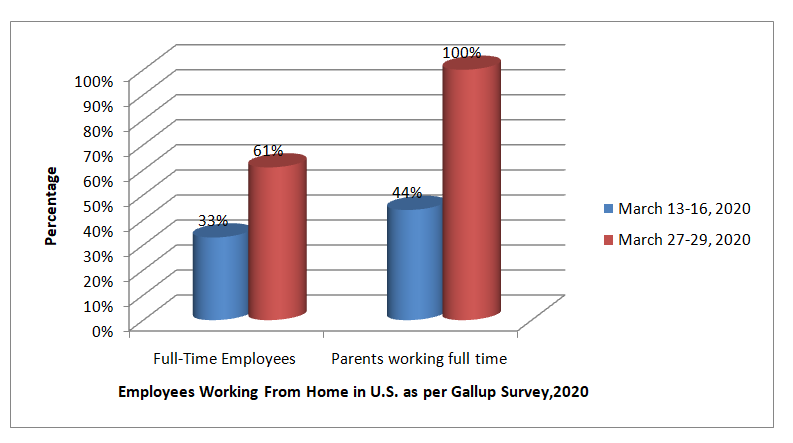Blogs

COVID-19 & Lockdown: Implications and Lessons for Managing Human Resources
COVID-19 which originated in Wuhan city of China and has spread its dangerous wings in almost the entire part of the world has left the countries and people across the globe stranded. With the world being highly impacted with more than 24 lakh corona positive cases and death toll rising to the north of 1.65 lakh, the global economy apparently may be hard hit in the present scenario and near future. The Governments and medical practitioners of U.S., Spain, Italy, France, Germany, U.K. China, Russia, India and other affected countries are still struggling to find a cure and vaccine for this contagious pandemic as the number of people succumbing to COVID-19 is increasing day by day.
Amidst all this, the big question in the mind of everyone is about the sustainability of business, jobs and the economy as a whole. COVID -19 has created one of the biggest challenges for the existence and survival of the mankind i.e. the human resources. However, every problem comes with learning. The lockdown imposed by the Government of India for ensuring social distancing is, no doubt, an essential necessity for the safety of the nation and nationals in the present situation. This has posed a problem for the organizations as to how to maintain continuity in its operations without violating the governmental regulations. COVID-19 and Lockdown have brought forth the following implications and lessons for human resource management in organizations:-
1. Working from Home / Telecommuting – The Need of the Hour
In HRM, much had been talked about work from home / telecommuting but barring a few companies in the IT and ITES sector, not many organizations in India were implementing it. Infosys, Dell India, Accenture, IBM India, Yahoo India are the top companies in India that allow work from home. Recently Tata Sons, Hindustan Unilever and IHCL and Indigo asked their office-based staff to work from home during the lockdown as the government strongly advised India Inc to implement this with minimum disruption of operations, to limit the spread of COVID-19.
According to the Gallup Panel Survey, U. S Workplaces are confronting unprecedented disruption due to COVID-19. If we compare the Gallup Panel surveys conducted in March 13-16, 2020 vs. March 27-29, 2020, the following developments are noteworthy:-
• The percentage of full-time employees working from home because of COVID-19 closures has increased from 33% to 61%.
• The percentage of parents working full time who have kept their kids home from school because of COVID-19 has increased from less than half (44%) to everyone (100%).

Work from home offers the following advantages:
• It enables organizations, people, society and the nation as a whole to leverage the benefits of digitalization.
• It results in a win-win situation for the employees and the organizations as not only it saves the time and expenses incurred in commuting to the workplace but also saves the cost of the organizations in terms of electricity, facilities to be provided by the employer, office space required and health hazards especially in the present context.
• With lesser number of people travelling for their jobs, it also reduces the number of vehicles on the road resulting in minimization of environmental pollution which has become an alarming problem in metro cities of India.
Besides, every organization can decide the days and timings when it requires the employees to be physically present in the office depending upon their work profile. Performance standards and accountability can be fixed for the employees so that organizational performance does not suffer due to such an arrangement.
2. Health and Hygiene - A Priority
Organizations should pay proper attention to the work environment and hygiene in their plants and offices in order to prevent their employees from health risks. The following measures need to be taken in this respect:
• Provision for regular medical check –ups
• Proper emission of pollutants in factories
• Proper ventilation and lighting
• Cleanliness at workplace
• Separate provision for spittoons and dustbins
• Social distancing to avoid infectious diseases
• Use of masks by employees at the workplace
• Sanitization of offices and plants
• Provision of sanitizers at workplace for employees
These are some of the steps which need to be taken for ensuring a hygienic working environment and preventing the spread of diseases which not only expose the workers to risk but also hamper the functioning of the organization. In this context, the principles of ergonomics can be also be applied for maximizing productivity and reducing fatigue and discomfort of the employees.
3. Happiness Management at Workplace
The combined effects of frightening uncertainty about physical and financial health in the near future and the pressures of required self-isolation have led to record levels of stress and worry that far surpass those recorded in past years. As per Gallup Survey 2020 when compared to Gallup Survey 2019, reports of daily worry have increased from 37% to 60% among the full-time working population in U.S. daily stress has increased from 48% to 65%. This increase in worry and stress level sends red flags for organizations to take immediate steps for managing employee happiness which, if not taken care of, may lead to disastrous effects on organizational productivity.

Organizations can support employees' overall wellbeing as they adjust their policies, workplaces, incentives, recognition, virtual events and development programs to the temporary new normal. A key factor lies in equipping managers to individualize to each person's situation.
Recently, in a survey conducted by Economic Times, top notch corporate employers like Dabur, Flipkart, Ola, Axis Bank, Bank of Baroda, Vedanta, RPG Group, EY, KPMG, Panasonic, Siemens, Deloitte, Microsoft, Wipro, ITC, AMD, Tata Steel, Schneider India, Dalmia Bharat Group, Accenture, Swiggy, Motilal Oswal Financial Services, RBS India, BigBasket and Welspun Group, said that saving human capital and wellbeing of employees is the most crucial task before their managers and HR leaders, in the COVID-19 crises. In fact, physical, psychological and emotional well-being of the human resources should occupy a leading priority in the HR Policies of organizations in the post-covid era also.
Psychological counseling, meditation and fitness sessions, celebrating employee birthdays at workplace, proper tea and lunch breaks, organizing happiness management workshops, team–building activities, learning and development programs would not only help mitigate the stress and anxiety of employees but would also enhance their productivity and prevent burn-out from routine and mundane schedule.
E - Commerce giant Flipkart also has initiated chai break and pasta live sessions to encourage informal social connect amongst its employees. Recently Microsoft and Ola have emphasized work-life balance of their employees and have made arrangements to enable the employees to balance their family and household priorities with work.
4. Managing Employee Performance and Productivity
In this time of crises, it is natural for employers to be concerned about the productivity and performance of the employees because the very sustainability of an organization is dependent on its human resources. For earning the trust of the employees in this crises situation, IT major Capgemini has offered high single digit increments for its 84,000 employees that comprise 70% of its workforce with effect from April 1, 2020. In fact, at present 95% of its work force has been enabled to work from home as compared to 15-20% before the COVID -19 break out. Besides, the company has also created a fund of Rs. 200 crores for any medical emergency of employees apart from the medical insurance. All these measures will definitely raise the morale of the employees and build up trust and commitment towards the company which is bound to have a positive impact on their productivity and performance. Moreover, the system of performance management needs to be adopted rather than merely annual performance appraisal.
The underlying conclusion is that organizations which will prosper and succeed in the present uncertain and critical environment will be the ones who are able to motivate and support their employees together with assigning challenging tasks and managing rather than simply measuring employee performance.
